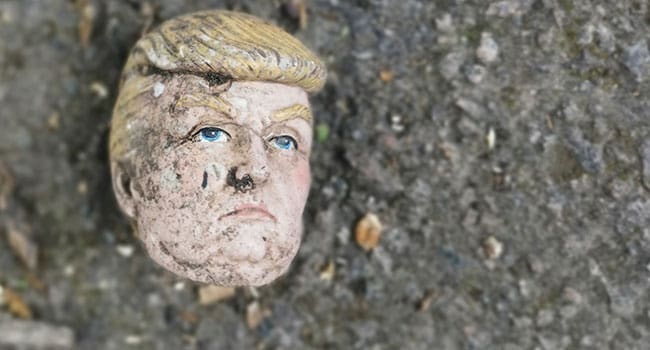 When I was a kid at David G. Burnet Elementary School in Dallas, Texas, we would stand at our desks every morning and do the Declaration of Independence.
When I was a kid at David G. Burnet Elementary School in Dallas, Texas, we would stand at our desks every morning and do the Declaration of Independence.
“I pledge allegiance to the flag of the United States of America, and to the republic for which it stands,” we’d say, our hands over our hearts. “One nation, under God, with liberty and justice for all.”
Some days, we’d practise hiding under our desks, for when a North Vietnamese fighter jet would somehow make its way across the ocean to suburban Dallas and target David G. Burnet. We were seven, eight and nine years old. We’d do that.
We were taught, from the very first day in the very first grade, to respect and support America’s armed forces. It was as indelibly part of the culture as the flag found in every classroom and flying atop every school.
Now, the notion that Canada and America are different is so true, so self-evident, it barely mentions saying. We’re different nations with different values.
And one of those values centres on men and women in uniform. We Canadians, of course, respect and remember those in our armed forces, too. But not in the way the Americans do. Not as much.
To the American people – that’s what they always say down there, “the American people,” like it is a thing unto itself – their armed forces are why they’re a nation. It’s at the centre of their identity. And woe unto whomever speaks ill of military service.
The current significance of all this can be traced back to a single day, the day Donald J. Trump graduated from the Wharton School at the University Pennsylvania. On that day, the Tet Offensive – and what followed – left 40 American men-boys dead.
Trump partied with his friends.
He had reached the age to be drafted and was in peak physical health, having played squash, tennis and golf throughout his school years. He had received four deferments from military service because he was still in school.
But when he graduated, Trump suddenly was fit no longer. He had developed “bone spurs.”
No one has seen the medical assessment that diagnosed bone spurs. Trump and his campaign team have for years ignored requests for the paperwork that helped him avoid service in Vietnam.
So we have to take his word for it. Other politicians-to-be got deferments. It wasn’t unusual. It wasn’t rare.
What’s unusual – what’s exceedingly rare, in a nation that venerates military service as much as the United States does – is what Trump is alleged to have said about those who gave life and limb to serve their country in Vietnam.
Those men and women were “suckers,” Trump has said. They were “losers.”
The news that Trump said such things about America’s military landed like a bomb on the presidential vote, now about 60 days away. The Atlantic reported his words first. Trump and his online fans, of course, dismissed The Atlantic – which has been publishing for nearly 200 years and won innumerable awards – as “fake news.”
But then Fox News reported that The Atlantic had indeed told the truth. Fox independently corroborated Trump’s words with senior officials who had directly worked for him.
At that point, things perceptibly changed. For Trump and his winged monkeys, it became a lot harder to deny what The Atlantic reported. You know, that Trump said American military heroes were “losers” and “suckers.”
In American politics, the October Surprise typically happens in October, just before a presidential vote. It can change the outcome of an election – like FBI director James Comey’s announcement of a re-investigation of Hillary Clinton’s emails in 2016.
That investigation was abandoned the day before the vote. But it installed Trump in the White House.
Trump already faced myriad challenges as he seeks re-election in 2020: a virus that has killed nearly 200,000 Americans, an economy in shambles, a united Democratic Party.
But calling America’s men and women in uniform – the ones who literally gave their lives while Trump partied with models and escorts – “suckers” and “losers” may well be the end for him. That may well be the thing that rids us of the pestilence that is Trump, once and for all.
Back at David G. Burnet in Dallas, we were taught to always, always respect the military. That was one lesson we learned very well.
Donald Trump, perhaps, is about to be taught the same lesson.
Warren Kinsella is a Canadian journalist, political adviser and commentator.
Warren is a Troy Media contributor. Why aren’t you?
The views, opinions and positions expressed by columnists and contributors are the author’s alone. They do not inherently or expressly reflect the views, opinions and/or positions of our publication.


